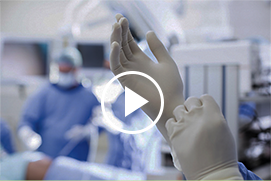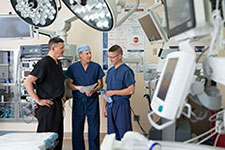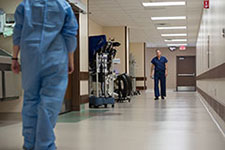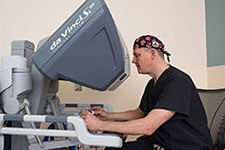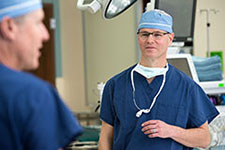During colorectal surgery, parts of the colon or rectum are surgically removed. You will be given instructions on how to get ready for your surgery. Follow these instructions carefully. You will likely be admitted to the hospital on the day of your surgery. In certain cases, you may need to be admitted to the hospital the day before. Ask questions if something is unclear.
Preparing a few weeks before surgery
- Have a complete physical exam as instructed by your doctor.
- Ask about medicines. Tell your surgeon about all medicines you take, and ask whether you should stop taking them. This includes prescription medicines, aspirin and other NSAIDs, and other over-the-counter medicines. Mention any herbs or supplements you take.
- Quit smoking. Smoking increases surgery risks and slows healing.
- Exercise. Stay on a program of regular exercise.
Preparing the day before surgery
- Have only clear liquids. For 12–24 hours before your surgery, you will be told not to eat any solid foods and to drink only clear liquids. These liquids include broth, black coffee, gelatin, and clear fruit juice.
- Do your bowel prep. To be sure your colon is clear of stool, you’ll be asked to do a bowel prep for 12–24 hours before surgery. This involves drinking a liquid laxative, using enemas, or both.
- Make sure your stomach is empty. Do not have anything to eat or drink, including water and chewing gum, after midnight the night before surgery. (It is OK to drink your bowel prep liquid during this time.) If you are asked to take antibiotic pills before surgery, take them with small sips of water.
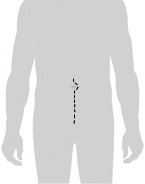 |
| The incision may run vertically around your navel. |
The day of surgery
When you arrive at the hospital, you will be asked fill out certain forms. You will then change into a gown. An IV (intravenous) line will be inserted into your arm. This gives you fluids and medicines. You’ll meet with your anesthesiologist or nurse anesthetist to discuss the medicinethat helps you sleep during surgery. Ask any questions you have at this time. Before surgery begins, you’ll be given general anesthesia to put you into a deep sleep. A soft tube called a catheter may be placed into your bladder to drain urine.
During your durgery
- Your surgery will be done through one cut (incision) in your abdomen. This is called open surgery. The incision may be several inches long. Your surgeon can tell you about the incision you will have.
- The problem part of the colon is resected (removed). Sometimes the two ends of the colon are joined. This is called an anastomosis.
- Once surgery is done, you’ll be taken to a recovery room.
Types of colon resection
The idea of having part of your colon removed may sound scary. But part or all of the colon can be resected (removed) without causing serious problems. After the section of bowel is removed, the two ends are then reconnected (anastomosis). Below are some of the surgeries that can be performed on the colon. The type of surgery depends on the location of the colon problem.
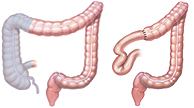 |
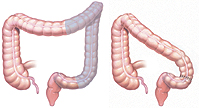 |
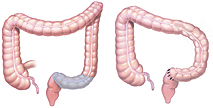 |
| Right Hemicolectomy: | Left Hemicolectomy: | Sigmoid Colectomy (Sigmoidectomy): |
| Part or all of the right side (ascending) colon is removed. The remaining colon is then reconnected to the small intestine. | Part or all of the left side (descending) colon is removed. The remaining colon is then reconnected to the rectum. | Part or all of the sigmoid colon is removed. The descending colon is then reconnected to the rectum. |
Risks and possible complicationsRisks and possible complications of colon surgery include:
|



